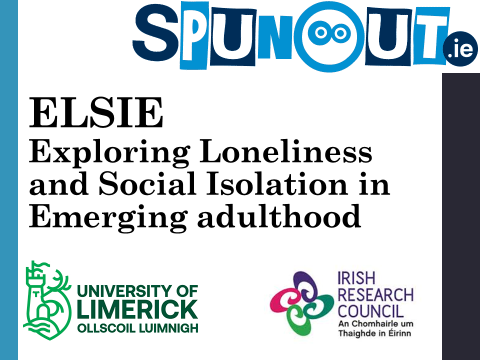
ELSIE is a partnership with SpunOut.ie and funded by a New Foundations grant from the Irish Research Council to Dr Ann-Marie Creaven.
ELSIE is our acronym for the Exploring Loneliness and Social Isolation in Emerging adulthood project. Although loneliness is often viewed as a problem of older adulthood, research indicates that young adults also have high rates of loneliness. The goal of this project is to understand more about loneliness during the phase of life between adolescence and fully-fledged adulthood, described as “emerging adulthood”. This phase of life (from about 16 to 25 years), is a time of change in several factors related to loneliness – for example, this is when most people finish school, a transition that involves changes in the social networks and friendships that protect us from loneliness.
Meet the team!
Dr Ann-Marie Creaven is a lecturer in psychology at the University of Limerick, interested in how our social relationships influence health and well-being.
Emma Kirwan is a PhD researcher at UL. Emma's research explores loneliness in emerging adulthood and she takes a leading role in ELSIE.
Dr Páraic O Suilleabháin is a lecturer in psychology at UL, and coordinates the research training for trainees on our clinical psychology programme.
Dr Annette Burns is Loneliness Interventions Officer at the Institute of Public Health, involved in several loneliness projects relating to older adulthood, as well as ELSIE.
For participants
More about this study…
This study invites young adults to share their views and experiences of loneliness to better understand the experience of loneliness from the perspective of young adults and to identify what young adults believe causes and maintains feelings of loneliness.
This study forms part of a larger project which aims to investigate the risk factors for loneliness in young adulthood. The results of this study are intended to inform the development of a survey study. Identifying what might lead a young adult to experience loneliness, and what might keep young adults feeling lonely, is an important step in trying to prevent and minimise the effects of loneliness.
The information that you have provided will be kept private and stored securely on the researcher’s password protected computer. Once the recordings have been transcribed (typed up), your recording will be destroyed. Your name or other identifying information will not be included in reports.
Once the research is complete, the results of this study will be shared to academic audiences through journal articles and conference presentations, and will also be summarised for lay and young adult audiences. If you would like to receive a summary of the research findings you can email us: [email protected] .
Thank you again for participating!
.
From the archive
Listen back to Ann-Marie discuss friendships and loneliness during COVID on RTÉ Radio 1:
Read our latest newsletter here!
And here you'll find previous updates:
Emma presented our protocol for a scoping review of the literature on loneliness in emerging adulthood at the Division of Health Psychology, Psychology, Health and Medicine Conference in May 2021.
The protocol is under review in Systematic Reviews; find it here.

